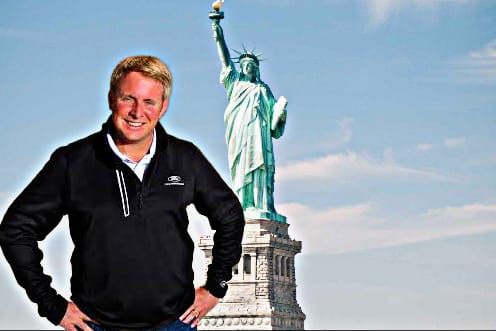Henry Ford III is the great-grandson of Henry Ford, the founder of the Ford Motor Company, and the grandson of Henry Ford II, one of the most prominent and transformative figures in automotive history. Though he has not reached the same level of fame as his forefathers, Henry Ford III’s influence on the modern-day operations of Ford Motor Company and his continued role within the organization are crucial to understanding the evolution of one of the world’s most iconic automobile brands.
In this article, we will explore the life, career, and legacy of Henry Ford III, his relationship to the Ford family legacy, and his significant role in shaping the future of Ford Motor Company in the 21st century. We will also look at how his leadership is influencing the company’s direction in terms of sustainability, innovation, and modern business practices.
Early Life and Education

Born in 1987, Henry Ford III is part of the fourth generation of the Ford family to be associated with the Ford Motor Company. He is the son of William Clay Ford Jr., the former executive chairman of Ford Motor Company and great-grandson of Edsel Ford, Henry Ford’s only son. Growing up in such a prestigious family, Henry Ford III was exposed to the world of automobiles, business, and global industry from an early age. His childhood was not all about luxury and privilege; instead, it was shaped by the family’s legacy, which often meant that expectations were high, and the pressure to succeed was immense.
Henry Ford III attended the prestigious Georgetown University in Washington, D.C., where he earned a degree in History. After graduating, he went on to attend the Harvard Business School, where he further honed his skills in business and leadership. Despite his family’s automotive background, Henry Ford III did not automatically follow the path into the family business. Instead, he chose to build his career with the goal of demonstrating his abilities independently of the Ford name. His education at these esteemed institutions gave him a solid foundation in both business practices and leadership strategies, preparing him for the challenges he would face within Ford Motor Company.
Joining Ford Motor Company

After completing his education, Henry Ford III began his professional career outside the Ford Motor Company to establish his credentials. He first worked at the investment firm Morgan Stanley before deciding to join the family business. His decision to join Ford came after gaining experience in the financial sector, which was seen as a smart move to better understand the economic dynamics of the global market before taking on roles of responsibility at the company.
In 2007, Henry Ford III officially joined Ford Motor Company, entering at a time when the company was undergoing significant changes. Under the leadership of his great-uncle, Bill Ford, and later Alan Mulally, Ford was navigating a period of financial crisis, industry disruption, and intense competition from both foreign automakers and domestic rivals like General Motors and Chrysler. The company had just avoided bankruptcy during the global financial crisis by securing a loan with the help of the Ford family’s substantial stake in the business.
Henry Ford III’s initial role at Ford was in the company’s marketing and sales division, where he worked on developing strategies to enhance the Ford brand. His focus was on identifying consumer trends and understanding what would resonate with the younger generation of car buyers. This was a critical time for Ford, as the company was rebuilding after the financial crisis and was under intense pressure to innovate and stay relevant in the automotive market.
Over the years, Henry Ford III’s roles within Ford evolved, and he took on more significant responsibilities, including working on corporate strategy and product development. His work in these areas reflected his ability to combine his understanding of the family legacy with his contemporary knowledge of business and consumer needs. His approach was more modern and forward-thinking, incorporating new technology, global expansion, and sustainability into the future direction of Ford.
Leadership and Influence in Ford Motor Company

While Henry Ford III may not have held a high-profile executive position as his grandfather or great-grandfather did, his influence on Ford’s operations has been significant. He worked closely with senior management, including former CEO Alan Mulally and current CEO Jim Farley, on a number of key initiatives aimed at transforming Ford into a more agile and forward-looking company.
One of the core areas where Henry Ford III’s leadership has been instrumental is Ford’s shift toward electric vehicles (EVs). As part of the family’s long-term vision for the company, Ford has made significant investments in electric mobility, which Henry Ford III actively supports. The company has committed billions of dollars to the development of electric cars, with models like the Ford Mustang Mach-E and the electric F-150 Lightning receiving critical acclaim. Ford’s EV strategy is not just about keeping up with industry trends; it is about ensuring that Ford remains at the forefront of automotive innovation.
In his role, Henry Ford III has championed sustainability within the company, aligning with the broader global movement toward clean energy and responsible manufacturing. His leadership in sustainability has helped Ford develop new models that meet the increasing demand for more eco-friendly vehicles. By focusing on electric cars, hybrid technology, and greener manufacturing processes, Henry Ford III is helping Ford Motor Company stay competitive in an era where environmental consciousness is becoming a major consideration for consumers.
Beyond the focus on EVs, Henry Ford III has been involved in shaping Ford’s corporate culture. The company has made significant strides in improving its diversity and inclusion initiatives. Under his influence, Ford has adopted policies that ensure more inclusive hiring practices, equal pay, and a focus on creating an environment where diverse perspectives can thrive. This modern approach to corporate governance reflects the evolving landscape of business in the 21st century and aligns with the broader cultural shifts in society today.
The Role of the Ford Family in the 21st Century
Ford Motor Company has always been a family-run business, and the Ford family’s influence is still present today, with Henry Ford III playing a role in the company’s strategic decisions. The Ford family has remained committed to maintaining control of the company, with several generations of the Ford family holding key positions in the company. While the business has evolved and professional management has taken over many functions, the family’s involvement is still deeply ingrained in the corporate identity of Ford.
As part of the fourth generation of the Ford family, Henry Ford III represents the continuation of the Ford legacy. The younger Ford’s involvement in the company is not just about preserving the family’s heritage, but also about making sure that Ford remains relevant in an era where technological innovation, environmental sustainability, and changing consumer preferences are the driving forces behind the automotive industry. His work is helping to ensure that Ford can evolve to meet these challenges while still honoring its historical legacy.
One of the critical challenges for the Ford family is navigating the balance between tradition and innovation. The company’s legacy is built on mass production and cars that were accessible to the average consumer, and it is essential to honor that history while also positioning Ford for the future. Henry Ford III’s leadership, vision, and practical understanding of the business are integral to achieving this balance.
Personal Life and Public Image
Henry Ford III has maintained a relatively low profile compared to some of his predecessors. While his family name places him in the public eye, he has often shied away from the intense media attention that many celebrities or public figures would attract. His approach to leadership has always been one of humility, and he has often been seen as a pragmatic figure who avoids the ego-driven leadership styles that have sometimes been associated with high-profile family-run businesses.
Henry Ford III’s personal life is largely kept private, but his commitment to philanthropy and social causes is known within Ford circles. Much like his forefathers, he has been involved in various charitable endeavors, supporting causes that align with his personal values and the company’s mission. Whether it is supporting local communities, advancing education, or promoting environmental initiatives, Henry Ford III has followed in the footsteps of his family in terms of giving back to society.
Conclusion: The Legacy Continues
Henry Ford III may not yet be as widely recognized as his great-grandfather or great-uncle, but his contributions to the Ford Motor Company and his role in shaping its future cannot be overstated. In many ways, his leadership exemplifies the ongoing evolution of Ford as it adapts to a rapidly changing world. From electric vehicles to sustainability, his focus is on ensuring that Ford remains an industry leader while staying true to its rich history and the values instilled by Henry Ford.
As the automotive world continues to evolve, the Ford family’s influence on the company remains undeniable. Henry Ford III represents the future of that legacy, bringing modern business acumen and innovative thinking to the table. While much has changed since Henry Ford’s time, the core principles of quality, innovation, and accessibility remain as relevant as ever.
With Henry Ford III’s continued involvement, the Ford Motor Company is poised to not only meet the challenges of the 21st century but to redefine what it means to be a leader in the automotive industry. His ability to adapt to new technologies, his commitment to sustainability, and his focus on inclusivity and diversity are key factors that will guide the company as it moves into the next era of global business and automotive excellence.

